- Home
- Member Resources
- Councils and Committees
- Forensic Pathology Topic Center
Forensic Pathology Topic Center
Recognizing the needs of the pathologist and pathology with regard to forensic casework.

Brooklyn Mortuary, New York City Office of Chief Medical Examiner (OCME) c. 2003
Photograph by permission of Gina Santucci.
Contact Information
Jennifer Murrie, BS, MT(ASCP)
325 Waukegan Road
Northfield, IL 60093
jmurrie@cap.org
Latest from the Forensic Pathology Committee
-
CAP Forensic Pathology Cases Program (FR/FR1) Order FR/FR1
- FR prepares hospital-based pathologists, forensic pathologists, residents, fellows, and medical examiners/coroners for success by keeping them current in forensic pathology techniques and practices. This educational program is also designed for investigators, analysts, and technicians/technologists.
- Cases may include or reflect anthropologic materials, ballistics, dental identification, DNA identification, environmental pathology, forensic evidence, injury pattern, medicolegal issues, toxicology, and trace evidence.
-
Products of Conception Guidance
In response to outreach from members regarding the potential impact on the practice of pathology of the Dobbs v Jackson Supreme Court decision, the CAP created an aid for pathologists on the processing and reporting of pregnancy tissues/products of conception (POC) specimens.
-
CAPcast: Forensic Pathologists React to "Body of Proof"
Three members of the CAP's Forensic Pathology Committee react to how forensic scientists are portrayed in TV and film. In the first in the series, guests talked about the ABC show "Body of Proof."
Forensic Pathology Resources
Definitions
- Forensic pathology
- Forensic pathology is the subspecialty of pathology that directs its efforts to the examination of living or dead persons in order to provide an opinion concerning the cause, mechanism, and manner of disease, injury or death; the identification of persons; the significance of biological and physical evidence; the correlation and/or reconstruction of wounds, wound patterns, and sequences; and conducting comprehensive medicolegal death investigations.
- Forensic pathologist
- A forensic pathologist is a pathologist with special training and experience in forensic pathology who is actively engaged in medicolegal autopsies and death investigations. Forensic pathologists shall be board-certified by the American Board of Pathology or American Osteopathic Board of Pathology after appropriate training and passing a rigorous examination, or a non-USA based pathologist with equivalent certification. The practicing forensic pathologist is licensed in one or more states; he/she is skilled in conducting death investigations, interpreting injuries in both fatal and non-fatal cases, performing medicolegal examinations, and determining cause and manner of death.
Additional Forensic Pathology Resources

Fee-for-Service Autopsies
The autopsy fee-for-service list consists of members of the College of American Pathologists (CAP) who expressed an interest in performing autopsies on a fee-for-service basis.
Member pathologists must log in to access the Fee-for-Service Autopsy Listing Interest Form if you want to include your information on the list. The list is a service to members of the public seeking a pathologist to perform an autopsy.
In addition to the CAP Autopsy fee-for-service list, NAME has a private autopsy list.
Guidelines for Cooperation Between Pathologists and Funeral Professional
CAP revised these guidelines (PDF, 103 K) at the request of the National Funeral Directors Association. Input was obtained from funeral directors and from pathologists serving on the CAP autopsy and forensic pathology committees.
Sample Forensic Case
Range-of-Fire Determination
Authors: Elizabeth Douglas, MD, FCAP; Joseph A. Prahlow, MD, FCAP
Guidelines, Statements, and Position Papers
Related Links
- Autopsy Topic Center
- U.S. Death Certification Laws by State
- Anatomic Pathology Educations Programs
- National Association of Medical Examiners (NAME)
- NAME is the national professional organization of physician medical examiners, medicolegal death investigators and death investigation system administrators who perform the official duties of the medicolegal investigation of deaths of public interest in the United States. Their web site includes information about the forensic pathology match, forensic autopsy standards, forensic pathology position papers, information on how to become a forensic pathologist, job offerings, and a variety of educational content.
- Centers for Disease Control and Prevention (CDC)
- CDC is the nation’s leading science-based, data-driven, service organization that protects the public’s health. Their website has a variety of useful resources about disease and death certification.
- National Center for Health Statistics (NCHS)
- The National Center for Health Statistics (NCHS) collects, analyzes, and disseminates timely, relevant, and accurate health data and statistics. Our products and services inform the public and guide program and policy decisions to improve our nation’s health.
- American Academy of Forensic Sciences
- The American Academy of Forensic Sciences (AAFS) is a multidisciplinary professional organization that provides leadership to advance science and its application to the legal system. Membership is comprised of pathologists, attorneys, dentists, toxicologists, anthropologists, document examiners, digital evidence experts, psychiatrists, engineers, physicists, chemists, criminalists, educators, researchers, and others. Our objectives are to promote professionalism, integrity, competency, education, foster research, improve practice, and encourage collaboration in the forensic sciences.
CAP publications available for purchase through CAP Publications
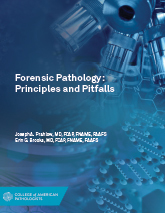
Forensic Pathology: Principles and Pitfalls (PUB132)
Joseph A. Prahlow, MD, FCAP, FNAME, FAAFS, editor
Erin G. Brooks, MD, FCAP, FNAME, FAAFS, editor
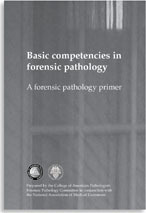
Basic Competencies in Forensic Pathology: A Forensic Pathology Primer (PUB120)
Forensic Pathology Committee, editors
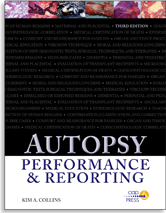
Autopsy Performance & Reporting, 3rd Edition (PUB126)
Kim A. Collins, MD, editor
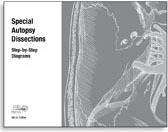
Special Autopsy Dissections (PUB122)
Kim A. Collins, MD, FCAP
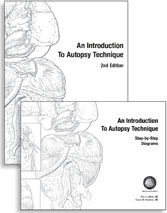
An Introduction to Autopsy Technique, 2nd Edition (PUB119)
Kim A. Collins, MD, FCAP, editor
Grover M. Hutchins, MD, FCAP, editor

Autopsy: Aiding the Living by Understanding Death (PUB100) - Brochure
Autopsy Committee, editors
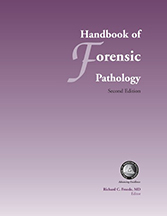
Handbook of Forensic Pathology, 2nd Edition (PUB115) - eBook
Richard C. Froede, MD
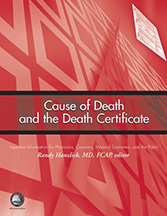
Cause of Death and the Death Certificate - eBook
Randy Hanzlick, MD
YourPathologist.org Patient Resources
CAP Public Policies
The CAP Public Policies outline the CAP's positions on the following issues:
- Technological Adjuncts to the Autopsy
- Optimizing Death Investigations and Forensic Sciences Practices
- Criteria for Autopsies
- Restrictions on the Uses of Autopsy Materials
- Payment and Performance of the Autopsy Service
- Sudden Infant Death Syndrome (SIDS)
- Certification of Death
- Observation of an Autopsy as Punishment
- Informed Consent for Autopsy
- Retention of Laboratory Records and Materials
- Autopsy Organ and Tissue Retention
- Requirements of Chief Medical Examiners
Join the Forensic Pathology Committee
Learn more about our committee activities and how to join the Forensic Pathology Committee.
- Login and CAP Membership Required.